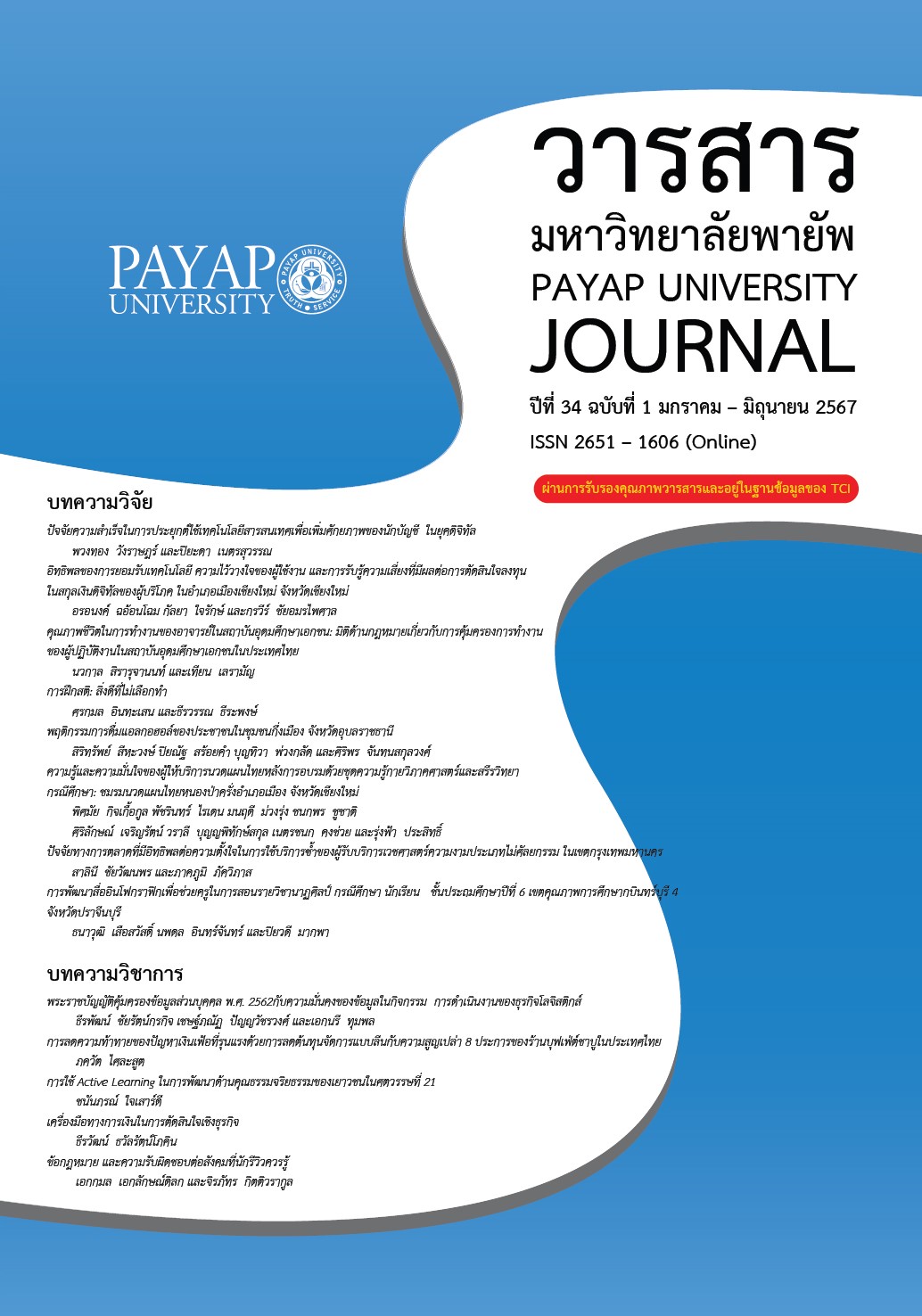อิทธิพลของการยอมรับเทคโนโลยี ความไว้วางใจของผู้ใช้งาน และการรับรู้ความเสี่ยงที่มีผลต่อการตัดสินใจลงทุนในสกุลเงินดิจิทัลของผู้บริโภค ในอำเภอเมืองเชียงใหม่ จังหวัดเชียงใหม่
Main Article Content
บทคัดย่อ
การวิจัยครั้งนี้มีวัตถุประสงค์เพื่อ 1) ศึกษาพฤติกรรมการลงทุนในสกุลเงินดิจิทัลของผู้บริโภค ในอำเภอเมืองเชียงใหม่ จังหวัดเชียงใหม่ 2) ศึกษาปัจจัยที่มีอิทธิพลต่อการตัดสินใจลงทุนในสกุลเงินดิจิทัลของผู้บริโภคในอำเภอเมืองเชียงใหม่ จังหวัดเชียงใหม่ เก็บรวบรวมข้อมูลด้วยแบบสอบถาม กับกลุ่มตัวอย่าง จำนวน 385 คน วิเคราะห์ข้อมูลโดยใช้สถิติเชิงพรรณนา ได้แก่ ค่าความถี่ ค่าร้อยละ ค่าเฉลี่ย และค่าส่วนเบี่ยงเบนมาตรฐาน สถิติเชิงอนุมาน ได้แก่ การวิเคราะห์การถดถอยพหุคูณ
ผลการวิจัยพบว่า พฤติกรรมการลงทุนในสกุลเงินดิจิทัล ส่วนใหญ่รู้จักสกุลเงินดิจิทัลจากเพื่อนหรือคนรู้จักแนะนำมากที่สุด มีประสบการณ์การลงทุนในสกุลเงินดิจิทัลมากกว่า 1 ปี ผลตอบแทน เป็นปัจจัยที่ทำให้ผู้บริโภคเลือกลงทุนในสกุลเงินดิจิทัลมากที่สุด เงินที่ใช้ลงทุนในสกุลเงินดิจิทัลมาจากเงินออม ปริมาณเงินลงทุนของผู้บริโภคที่มากที่สุดที่เคยลงทุนอยู่ที่ 40,615.16 บาท สกุลเงิน BTC (Bitcoin) ถือเป็นสกุลเงินดิจิทัลที่ผู้บริโภคเลือกลงทุนมากที่สุด ให้ความสำคัญกับปัจจัยการยอมรับเทคโนโลยีมากที่สุด รองลงมาคือ ปัจจัยความไว้วางใจของผู้ใช้งาน และปัจจัยการรับรู้ความเสี่ยง ตามลำดับ
ทั้งนี้ ปัจจัยการยอมรับเทคโนโลยีเป็นปัจจัยสามารถพยากรณ์ เป็นปัจจัยที่มีอิทธิพล ต่อการตัดสินใจลงทุนในสกุลเงินดิจิทัลของผู้บริโภคในอำเภอเมืองเชียงใหม่ จังหวัดเชียงใหม่ ได้ร้อยละ 80 อย่างมีนัยสำคัญทางสถิติที่ระดับ 0.05 มีค่าสัมประสิทธิ์ในการพยากรณ์เท่ากับ 0.64
Article Details
เอกสารอ้างอิง
กษมา จินุกูล. (2562). การรับรู้ความเสี่ยงและความไว้วางใจที่ส่งผลต่อความตั้งใจในการทำธุรกรรมทางการเงินผ่านธนาคารบนมือถือของลูกค้าธนาคารกรุงไทย จำกัด (มหาชน). [วิทยานิพนธ์ปริญญามหาบัณฑิต, มหาวิทยาลัยสงขลานครินทร์]. PSU Knowledge Bank. https://kb.psu.ac.th/psukb/handle/2016/17243
กษิดิศ สังสีเพชร. (2564). การตัดสินใจลงทุนในสกุลเงินดิจิทัลของนักลงทุนในเขตกรุงเทพมหานคร. [การศึกษาค้นคว้าอิสระปริญญามหาบัณฑิต ไม่ได้ตีพิมพ์]. มหาวิทยาลัยรามคำแหง.
กิจชัยยะ สุรารักษ์. (2562). แนวทางการป้องกันอาชญากรรมที่เกี่ยวกับสกุลเงินเข้ารหัสในประเทศไทย:กรณีศึกษาบิทคอยน์. [วิทยานิพนธ์ดุษฎีบัณฑิต, จุฬาลงกรณ์มหาวิทยาลัย]. Chula Digital Collections. https://digital.car.chula.ac.th/cgi/viewcontent.cgi?article=10820&context=chulaetd
เกียรติกร เทียนธรรมชาติ. (2561). อิทธิพลต่อการตัดสินใจยอมรับใช้เงินดิจิทัล (บิทคอยน์) ของผู้บริโภคกลุ่ม Millennials ในกรุงเทพมหานคร. [การศึกษาค้นคว้าอิสระปริญญามหาบัณฑิต, มหาวิทยาลัยธรรมศาสตร์]. TU Digital Collections. https://ethesisarchive.library.tu.ac.th/thesis/2018/TU_2018_5923036171_7492_9464.pdf
ขวัญชนก โชคชัยวงศ์. (2565). ปัจจัยด้านพฤติกรรมที่มีผลต่อการตัดสินใจลงทุนในสกุลเงินดิจิทัล (Cryptocurrency) ของคนไทย. [การศึกษาค้นคว้าอิสระปริญญามหาบัณฑิต, มหาวิทยาลัยมหิดล]. CMMU Digital Archive. https://archive.cm.mahidol.ac.th/bitstream/123456789/4423/1/TP%20BM.009%202565.pdf
จิรายุทธ์ ธราธรรุ่งเรือง. (2563). ปัจจัยที่ส่งผลต่อการตัดสินใจใช้สกุลเงินดิจิทัลของธนาคารแห่งประเทศไทย. ใน ภัทรพรรณ อดทน. (บก.), การประชุมวิชาการและการนำเสนอผลงานวิชาการระดับชาติ UTCC Academic Day ครั้งที่ 4 พ.ศ. 2563 (น.2588- 2602). มหาวิทยาลัยหอการค้าไทย.https://utcc2.utcc.ac.th/academicday2020/proceeding_academicday.pdf
เชียงใหม่คริปโตซิตี้ ยกระดับเมืองด้วยเทคโนโลยี. (2565, 31 สิงหาคม). เชียงใหม่นิวส์. https://www.chiangmainews.co.th/news/2718482/
ธนัญชย์ กาฬเนตร และยุพาวรรณ วรรณวาณิชย์. (2564). โมเดลการยอมรับเทคโนโลยีและความไว้วางใจที่มีผลต่อการใช้บริการ “เอสซีบีอีซ”. วารสารวิชาการ สถาบันเทคโนโลยีแห่งสุวรรณภูมิ, 7(1), 374-389.
บรมกิจ ดอนละคร และนรชัย อรินต๊ะทราย. (2561). การเปิดรับเทคโนโลยี Block Chain ที่มีอิทธิพลต่อการตัดสินใจลงทุนใน Cryptocurrency ของนิสิตและบุคลากรในมหาวิทยาลัยนเรศวร. [การศึกษาค้นคว้าอิสระปริญญาบัณฑิต ไม่ได้ตีพิมพ์]. มหาวิทยาลัยนเรศวร.
ปัญจพงศ์ ลอยไสว. (2563). ปัจจัยที่มีผลต่อการลงทุนบิตคอยน์ในประเทศไทย. [การศึกษาค้นคว้าอิสระปริญญามหาบัณฑิต, สถาบันบัณฑิตพัฒนาบริหารศาสตร์]. NIDA-GSAS. https://as.nida.ac.th/wp-content/uploads/2022/08/6210426030.pdf
ปรารถนาอารี มูฮัมหมัดอัลโคลเลซ. (2563). การยอมรับเทคโนโลยีพฤติกรรมผู้บริโภคออนไลน์ และการรับรู้ความเสี่ยงที่มีความสัมพันธ์ต่อการตัดสินใจใช้สกุลเงินดิจิทัลของผู้บริโภคในเขตพื้นที่กรุงเทพมหานคร. [สารนิพนธ์ปริญญามหาบัณฑิต, มหาวิทยาลัยศรีนครินทรวิโรฒ]. DSpace at Srinakharinwirot University. http://ir-ithesis.swu.ac.th/dspace/bitstream/123456789/930/1/gs611130371.pdf
วรวีร์ เธียรธนเกียรติ. (2560). การรับรู้ประโยชน์ของการช้อปปิ้งออนไลน์ การรับรู้ความเสี่ยง ความไว้วางใจและการตัดสินใจซื้อสินค้าอิเล็กทรอนิกส์ผ่านเว็บไซต์พาณิชย์อิเล็กทรอนิกส์. วารสารการสื่อสารและการจัดการ นิด้า, 3(1), 1-15.
ศศิธร พุ่มขจร. (2563). การศึกษาความเสี่ยงในการใช้ระบบพร้อมเพย์. [วิทยานิพนธ์ปริญญามหาบัณฑิต, มหาวิทยาลัยรังสิต]. RSUIR at Rangsit University. https://rsuir-library.rsu.ac.th/bitstream/123456789/525/1/Sasithorn%20Poomkajorn.pdf
เสาวลักษณ์ พูลทรัพย์. (2562). การยอมรับเทคโนโลยีที่มีผลต่อความตั้งใจใช้บริการชำระเงินสมทบกองทุนประกันสังคม ผ่านระบบอิเล็กทรอนิกส์ (e-Payment) ของสำนักงานประกันสังคม. [การศึกษาค้นคว้าอิสระปริญญามหาบัณฑิต, มหาวิทยาลัยเทคโนโลยีราชมงคลธัญบุรี]. DSpace at Rajamangala University of Technology Thanyaburi. http://www.repository.rmutt.ac.th/dspace/bitstream/123456789/3808/1/RMUTT-167644.pdf
อิปซอสส์ เปิดผลวิจัย 1 ใน 3 ของคนไทยสนใจซื้อบิทคอยน์. (2564, 25 มีนาคม). กรุงเทพธุรกิจ. www.bangkokbiznews.com/business/929147
Cochran, W.G. (1977). Sampling techniques (3rd ed.). John Wiley & Sons.
Davis, F. D., Bagozzi, R. P., & Warshaw, P. R. (1989).User acceptance of computer technology: Acomparisonof two theoretical. Journal of Management Science, 35(8), 982 – 1003.
Demirdogen, O., Yaprakli, S., Yilmaz, M. K., & Husain, J. (2010). Customer risk perceptions of internet banking- A study in Turkey. The Journal of Applied Business Research, 26(6), 57-67.
Gupta, S., Mathew, M., & Sama, H. R. (2021). Prioritizing intentions behind investment in cryptocurrency: A fuzzy analytical framework. Journal of Economic Studies, 48(8), 1442-1459.
Hong, I. B. & Cha, H.S. (2013). The mediating role of consumer trust in an online merchant in predicting purchase intention. International Journal of Information Management, 33(6), 927–939.
Morgan, R. & Hunt, S. (1994). The commitment-trust theory of relation marketing. Journal of Marketing, 58(3), 20-38.
Zhao, H. & Zhang, L. (2021). Financial literacy or investment experience: Which is more influential in cryptocurrency investment ?. International Journal of Bank Marketing, 39(7), 1208-1226.


